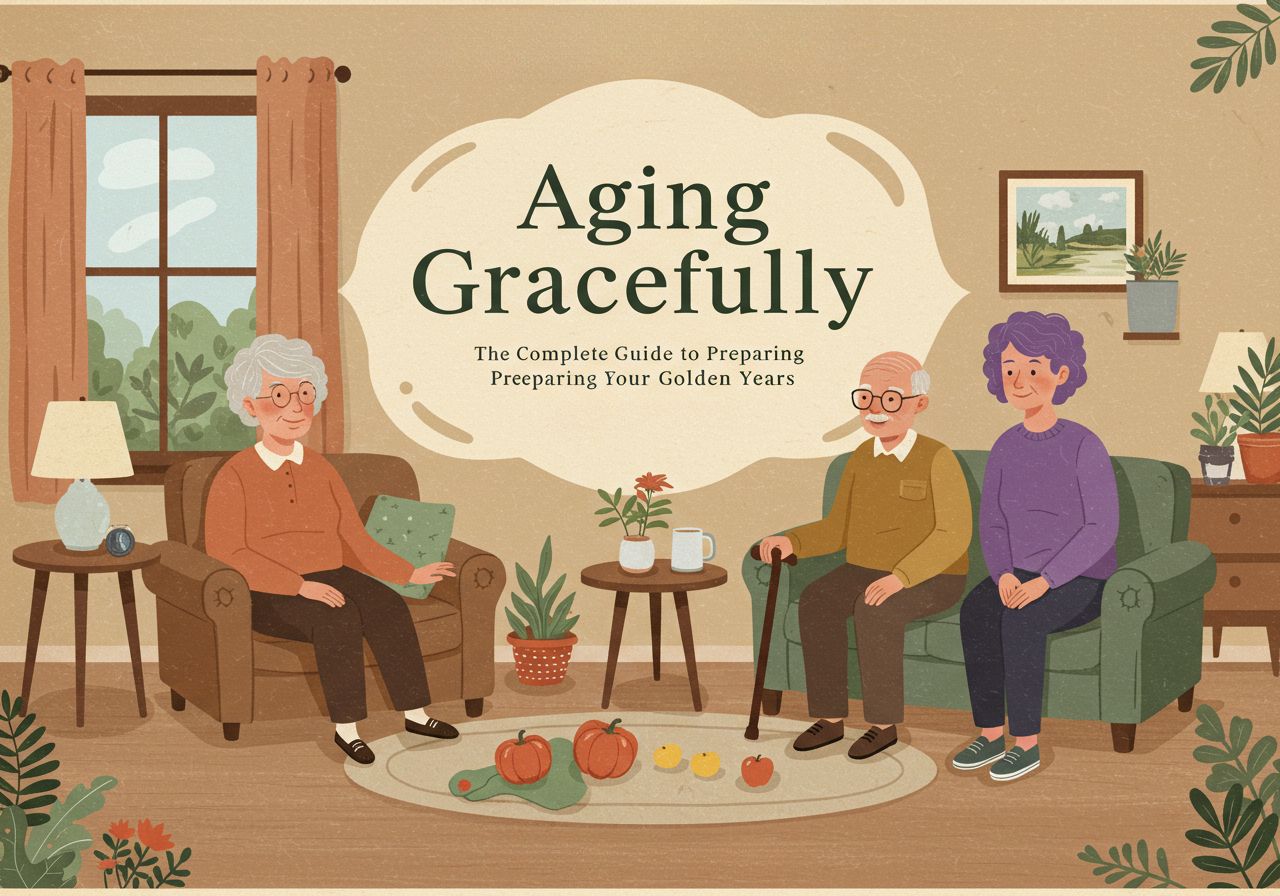Time waits for no one. The journey into our later years doesn’t have to be filled with dread or uncertainty, though. With thoughtful preparation and the right mindset, creating a fulfilling later life is absolutely possible.
Whether you’re in your 30s planning decades ahead or approaching retirement age, this guide will help prepare for old age across all dimensions of life financial security, physical health, mental wellbeing, social connections, and practical considerations.
Financial Preparation: Securing Your Future
Update Your Financial Goals
Retirement brings an entirely different set of priorities than earlier life stages. Financial objectives naturally evolve as people transition out of their working years.
Take Janet, for example, a 68-year-old retired accountant who completely reworked her financial plan after retiring. “I always thought I wanted to stay in my house forever,” she shared, “but after actually retiring, I realized I wanted to travel more and downsize to something with less maintenance.”
Some common financial goals for seniors include:
Funding extensive travel opportunities
Moving to a different home or location
Supporting children or grandchildren financially
Pursuing new hobbies or interests
Creating a legacy through charitable giving
Starting with clearly defined goals for the golden years with specific dollar figures attached to these dreams provides clarity that helps with appropriate withdrawal decisions from retirement accounts.
Plan for Healthcare Expenses
The staggering cost of healthcare in older age consistently surprises pre-retirees. According to Fidelity Investments, an average 65-year-old retired couple might need approximately $315,000 just for healthcare costs during retirement. Medicare helps, but it doesn’t cover everything.
Margaret, now 72, learned this lesson the hard way when she needed specialized care that Medicare didn’t fully cover. She fortunately had set aside funds in a health savings account (HSA), which allowed her to make tax-free withdrawals for those qualified medical expenses.
“I didn’t realize how many things Medicare wouldn’t cover,” Margaret explains. “My HSA was my saving grace when I needed dental implants and Medicare wouldn’t pay a penny toward them.”
Don’t forget about potential long-term care needs, which can quickly deplete savings. Speaking with a financial advisor about strategies like irrevocable trusts might help protect assets while potentially qualifying for programs like Supplemental Security Income (SSI) or Medicaid if needed.
Create a Realistic Budget
When living on a fixed income, understanding expenses becomes absolutely critical. Many financial advisors recommend tracking spending years before retirement to build this habit early.
Breaking costs into two main categories helps:
Essential costs: Housing, utilities, food, debt payments, and other necessities
Discretionary spending: Dining out, travel, entertainment, hobbies, and other “nice to haves”
Factor in your financial goals and remember that some expenses, like healthcare and housing, may increase during retirement. If your budget looks tight, you might need to adjust your goals or find ways to reduce costs.
Eliminate Debt Before Retirement
“The freedom of having zero debt in retirement is indescribable,” says Robert, a 76-year-old former teacher. He spent his 50s aggressively paying down his mortgage and credit cards, and now lives comfortably on a modest pension.
While some low-interest debt might make mathematical sense to maintain (like a small mortgage with a rate lower than investment returns), entering retirement debt-free provides incredible financial flexibility and peace of mind.
Physical Health: Your Greatest Asset
Make Exercise Non-Negotiable
If there’s one consistent theme across longevity research, it’s the critical importance of regular physical activity. Look at Ernestine Shepherd, who became the world’s oldest competitive female bodybuilder at age 75 after starting exercise in her mid-50s.
“Being out of shape as you get older is an option and not a mandate,” Shepherd wisely says. After her sister’s sudden death, she battled depression but found renewed purpose through fitness. Her daily routine includes running 10 miles and strength training proof that age truly is just a number when it comes to physical capability.
The science backs this up: regular exercise improves balance, coordination, breathing, circulation, and mental acuity. It helps control weight, lowers blood pressure, reduces heart disease risk, and strengthens muscles to prevent falls.
Exercise doesn’t need to be extreme though. Even moderate daily activity provides significant benefits. Consider:
Brisk walking or jogging
Swimming or water aerobics (easy on the joints!)
Yoga or tai chi for balance and flexibility
Cycling
Strength training with weights or resistance bands
James, an 80-year-old who still plays tennis three times a week, attributes his mobility and independence to staying active. “My friends who stopped moving in their 60s are now in wheelchairs,” he notes. “I promised myself that wouldn’t be me.”
Prioritize Nutrition and Sleep
Proper nutrition becomes increasingly important with age. Many nutritionists advise focusing on balanced meals rich in fruits, vegetables, lean proteins, and whole grains.
Dorothy, 84, changed her diet at 65 after experiencing constant fatigue. “I started eating more whole foods and less processed stuff,” she explains. “The difference in my energy levels was dramatic within just a few weeks.”
Quality sleep is equally crucial. When we sleep, our bodies repair and restore themselves. Dreams and deep sleep are vital for memory formation and brain health. Creating a consistent sleep routine and environment helps wake feeling refreshed.
Moderate Unhealthy Habits
Moderation becomes increasingly important with age. If possible, eliminating smoking entirely and keeping alcohol consumption moderate makes a significant difference in long-term health.
“I smoked for 30 years,” admits Carlos, 70. “Quitting at 55 was the hardest thing I’ve ever done, but my doctor says it likely added a decade to my life. My breathing improved within months.”
Schedule Regular Medical Check-ups
Preventative care is far more effective (and less expensive) than treating conditions after they’ve progressed. Making the most of doctor visits by scheduling regular check-ups, screenings, and vaccinations appropriate for each age is critical.
Frank avoided doctors for decades until a routine check-up caught his high blood pressure before it caused a stroke. “That check-up literally saved my life,” he says. “Now I’m religious about my annual physicals.”
Mental Wellbeing: Nurturing Your Mind
Build Your Support Team
Mental health often gets overlooked in retirement planning, but it’s absolutely essential. Aging brings unique mental health challenges, from dealing with loss to adapting to major life changes.
Starting by surrounding yourself with people who uplift and encourage you makes a difference. This includes loved ones as well as healthcare professionals who understand senior mental health.
Susan, 79, found that joining a widow support group after her husband’s death was crucial to her emotional recovery. “I thought I could handle the grief alone,” she says. “But being with others who understood exactly what I was going through made all the difference.”
Challenge Your Brain Regularly
Just as muscles need exercise, so does the brain. Keeping mentally sharp by engaging in stimulating activities helps:
Reading books and newspapers
Learning new skills or languages
Playing strategy games or solving puzzles
Taking classes or workshops
Engaging in thoughtful conversations
Gloria, 88, maintains incredible mental agility by challenging herself to learn something new each year most recently tackling digital photography and editing. “My friends who retired and just watched TV all day declined quickly,” she observes. “The brain needs exercise just as much as the body.”
Practice Mindfulness and Gratitude
Activities that nurture the spirit become increasingly valuable with age. This might include spending time in nature, meditation, creative pursuits, or volunteering for causes.
Thomas, 75, started a daily meditation practice after his heart attack at 62. “Those ten minutes each morning center me for the day ahead,” he says. “My cardiologist is amazed at how my blood pressure has stabilized, and she believes the meditation is a key factor.”
Social Connections: The Key to Happiness
Cultivate Meaningful Relationships
One of the most consistent findings in longevity research is the importance of social connections. Isolation in old age is associated with depression, cognitive decline, and even earlier mortality.
“Loneliness almost killed me,” admits Evelyn, 81. After her husband died, she barely left her house for months. “My neighbor finally dragged me to her book club. That group of women saved my life by giving me something to look forward to each week.”
Consider joining community groups, clubs, or religious organizations where you can connect with others who share your interests. One strategy is to consider adult communities where residents support each other through rides to appointments, meal preparation, and companionship.
Develop Hobbies That Can Adapt With You
Having interests that bring joy regardless of physical limitations is invaluable. Gerald took up painting in his 60s and continued well into his 90s, adapting his techniques as his hand dexterity changed.
As one senior advisor notes: “Get some hobbies or activities outside of work. If work is the only thing in your life and you stop working, you’ll just ‘sit and spin’.”
Martha, 86, began quilting after retirement. “As my arthritis has worsened, I’ve moved from hand-quilting to machine work,” she explains. “The important thing is that I can still create beautiful things, even as my body changes.”
Practical Considerations: Setting the Stage
Adapt Your Home for Aging in Place
Falls are a major hazard for older adults, often leading to serious injuries and complications. Proactively fall-proofing homes can make aging in place safer and more comfortable.
Consider modifications like:
Installing grab bars in bathrooms
Improving lighting throughout your home
Removing trip hazards like loose rugs
Adding railings to stairs
Installing a bench or seat in your shower
Organizing living spaces to avoid using stairs frequently
The Johnsons, both in their mid-70s, renovated their bathroom last year with thoughtfully included walk-in shower features and grab bars that look stylish now but will provide crucial support later. “We didn’t want to wait until after one of us fell,” Mrs. Johnson explains. “Making these changes while we’re still healthy just made sense.”
Explore Housing Options
While many people hope to age in their current homes, it’s wise to explore alternatives like:
Naturally occurring retirement communities (NORCs)
Senior living communities with various levels of support
Downsizing to more manageable, single-level homes
Co-housing arrangements with friends or family
After living in their two-story home for 40 years, the Garcias moved to a single-level townhouse at 70. “Our kids thought we were moving too soon,” Mr. Garcia shares, “but we wanted to choose where we lived rather than have circumstances choose for us.”
Create Advance Care Directives
Nobody likes thinking about end-of-life scenarios, but having clear legal documents saves tremendous stress for both seniors and their loved ones. Advance care directives including living wills, durable powers of attorney for healthcare, and healthcare proxies ensure wishes are followed even if someone can’t communicate them.
The Wilson family experienced this firsthand when their mother had a severe stroke. “Because Mom had completed her advance directives, we knew exactly what treatments she would and wouldn’t want,” her daughter explains. “It removed so much guesswork during an already stressful time.”
Plan for Emergencies
Creating systems that can help in crisis situations is crucial:
Keep emergency numbers easily accessible
Consider personal medical alert systems
Arrange for someone to check regularly
Have a communication plan with neighbors or nearby friends
After Harold fell in his kitchen and couldn’t reach his phone, he realized he needed better safeguards. He now wears a medical alert pendant and has a daily check-in system with his neighbor. “It gives both me and my children peace of mind,” he says.
Embracing the Journey
Getting older isn’t something that happens to someone else it’s happening to all of us, right now. But aging well isn’t about denial or fear; it’s about thoughtful preparation and embracing life’s natural progression.
The happiest seniors share common traits: they stay physically active, maintain close relationships, keep learning new things, handle their finances prudently, and adapt their environments to their changing needs.
And remarkably, these vibrant seniors often don’t seem “old” at all. They’re engaged and still growing just in different ways than they did at 30. That’s the kind of aging worth preparing for.
What steps are you taking today to prepare for a fulfilling tomorrow? Remember, the best time to start planning was yesterday but the second-best time is now.








